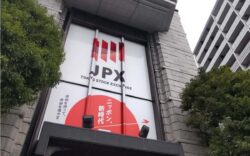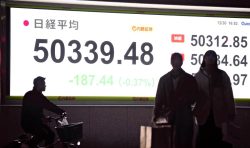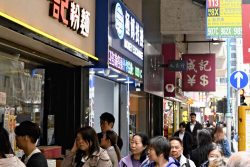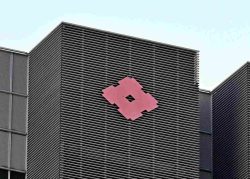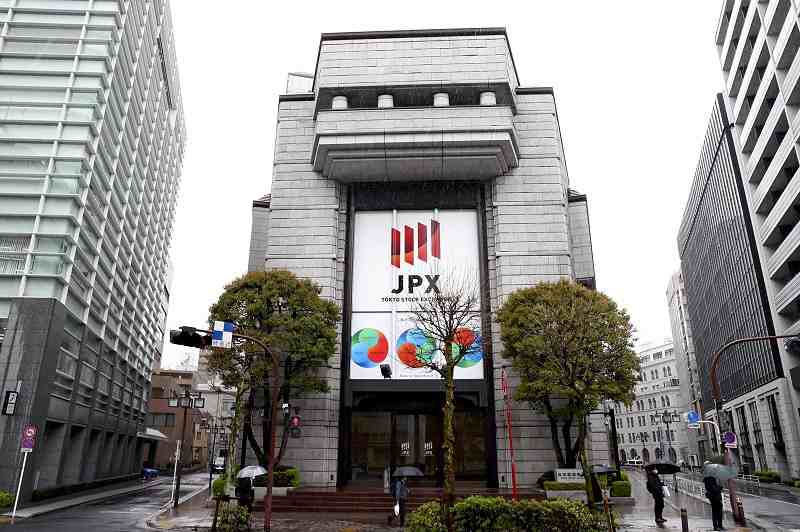
The Tokyo Stock Exchange
16:33 JST, December 5, 2020
To correct the extreme concentration of domestic stock trading in the Tokyo Stock Exchange, the government will set up a panel of experts to begin discussions in earnest as early as this year.
The panel will review the regulations stipulated in the Financial Instruments and Exchange Law and consider ways to encourage the use of alternative markets, such as the proprietary trading system (PTS). The aim is to create a system that will allow investors to continue trading even in the event of a major system failure at the TSE.
The Financial Services Agency announced the plan at a meeting on Dec. 1. The panel intends to compile a report by next spring.
In the United States, the New York Stock Exchange and the NASDAQ each have about 20% market share, and the PTS has a noticeable presence. In contrast, the TSE accounts for about 80% of stock trading in Japan, and the PTS only has about 5% market share due to the small number of stocks that can be traded.
On Oct. 1, a major system failure at the TSE resulted in a halt to trading for a whole day. The PTS was unable to make up for the volume of trades normally made on the TSE, bringing the problem of its dominance back into focus.
Many brokerage firms choose the market they will trade on based on the speed of trading and the number of stocks listed, which means orders tend to concentrate on the larger TSE. The FSA wants to review the “best execution policy” stipulated in the Financial Instruments and Exchange Law in order to mitigate this.
The best execution policy is a rule that requires brokerages to establish the best conditions for investors to buy and sell stocks. The FSA will consider including items such as “comparing multiple markets to determine where to place orders” and “using the market that offers the most favorable price.”
A senior FSA official said, “If the policy of ‘price first’ is presented as part of the best execution policy, the use of the PTS may be promoted.”
However, there has actually been an ongoing effort to promote inter-market competition since 1998, when the ban on the PTS was lifted. In the end, it has resulted in the TSE’s dominance. A source in the securities industry said: “Many investors believe it is more convenient to have many trades in one market. Diversification of the market is not easy.”
In addition, if the best execution policy is reviewed, there may be disadvantages such as an increased burden on securities firms due to system changes and trades taking a longer time to be executed.
Top Articles in Business
-

Prudential Life Insurance Plans to Fully Compensate for Damages Caused by Fraudulent Actions Without Waiting for Third-Party Committee Review
-

Narita Airport, Startup in Japan Demonstrate Machine to Compress Clothes for Tourists to Prevent People from Abandoning Suitcases
-

Asics Opens Factory for Onitsuka Tiger Brand in Western Japan
-

JR Tokai, Shizuoka Pref. Agree on Water Resources for Maglev Train Construction
-

KDDI Opens AI Data Center at Former Sharp Plant in Osaka Prefecture; Facility Will Provide Google’s Gemini AI Model for Domestic Users
JN ACCESS RANKING
-

Japan Institute to Use Domestic Commercial Optical Lattice Clock to Set Japan Standard Time
-

Israeli Ambassador to Japan Speaks about Japan’s Role in the Reconstruction of Gaza
-

Man Infected with Measles May Have Come in Contact with Many People in Tokyo, Went to Store, Restaurant Around When Symptoms Emerged
-

China Eyes Rare Earth Foothold in Malaysia to Maintain Dominance, Counter Japan, U.S.
-

Prudential Life Insurance Plans to Fully Compensate for Damages Caused by Fraudulent Actions Without Waiting for Third-Party Committee Review


